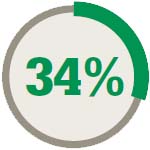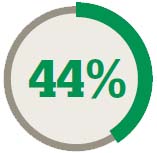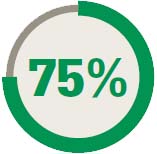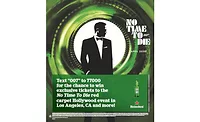Consumers demand nutritious, zero-proof beverages
Alcohol-free and functional beverages on the rise

As research and information about health and wellness has become more widely available in the digital age, consumers are being more proactive and purposeful with their food and beverage choices. Growing awareness about alcohol’s effect on the body also has spurred “mindful drinking” in recent years, prompting consumers to cut back on alcohol consumption and replace it with drinks that do more for their overall health and wellness.
While Mayo Clinic cites numerous studies showing that moderate amounts of any alcohol type can have heart benefits, the emerging “sober-curious” or mindful drinkers have shifted consumption to more zero-proof beverages and healthy drink options. For instance, Chicago-based Mintel’s “U.S. Flavor & Ingredient Trends 2019” report states that 45 percent of U.S. millennials would give up alcohol beverages to improve their health.
In response to these trends, beverage manufacturers are delivering on the growing demand for zero-proof and functional beverages, bringing a variety of options to market.
Emerging in the United Kingdom in 2014 and making its way to the United States, Dry January is a public health campaign that encourages consumers to limit or abstain from alcohol during the first month of the year. However, a recent survey by data analytics organization YouGov shows that the fad could be waning. In December 2019, only 14 percent of 22,760 survey respondents intended to partake in Dry January 2020 versus last year’s poll, when 23 percent of respondents said they planned to participate. However, the reason for decreasing participation is of note, as 33 percent of respondents said they now “don’t ever” drink alcohol, versus 24 percent from 2018.
Several beverage brands are noting this trend and have quickly responded. For instance, White Plains, N.Y.-based HEINEKEN USA released Heineken 0.0, an alcohol-free beer made with all-natural ingredients.
“The alcohol-free beer segment is growing globally. This trend is arriving in the U.S., and we’re getting out early with a premium product to satisfy consumers who appreciate beer taste and want a beer for occasions when they don’t necessarily want to consume alcohol,” says Ashleigh Phelps, Heineken brand manager at HEINEKEN USA. “With well-being and mindful drinking on the rise, Heineken 0.0 is the perfect addition to a beer drinker’s portfolio, allowing them to do more without giving up the drink they love.”
Phelps says that the outlook for zero-proof beverages is “great,” with Heineken 0.0 exceeding sales projections, and feedback from consumers and retailers being overwhelmingly positive. HEINEKEN USA is confident this category will keep growing, as sales are on target to double 2019 performance with increases in distribution — particularly on-premise, Phelps says.
The health-and-wellness market also is ripe for smaller brands specializing in “small batch” or “handcrafted” tonics, aperitifs, zero-proof beverages mimicking the flavor profiles of spirits, with some even dabbling with “euphorics,” which fuse herbs, botanicals, nutrients and adaptogens designed to induce relaxation without alcohol. Pioneering brands in the handcrafted category include Seedlip, Proteau, Kin Euphorics, Curious Elixirs and Ritual, to name a few.
“I’d encourage retailers to not be afraid of reaching people that are already converted. One of the cool things about creating Proteau was learning there’s an untapped need there,” said John deBary, founder of Proteau, a zero-proof, botanical aperitif. “I wouldn’t tell a retailer, ‘you need to carry this product because you need to take on this new market,’ it’s a market that already exists. It’s about innovation.”
Within the small-batch, zero-proof beer category, Outbound Brewing, San Diego, offers a non-alcohol product line that includes traditional zero-proof brews, CBD-infused (20 mg broad spectrum hemp), and cannabis-infused (10 mg THC) brews, available in Pale Haze, Blood Orange Haze and Grapefruit Haze flavors. Beverages such as Outbound’s, which have the added “perk” of CBD or THC, not only cater to the zero-proof-seeking consumers, but they speak to another rising trend: beverages with benefits.
Beverages that do more
Experts note that health-conscious consumers want what they drink to do more for their body. A report titled “Fusion Beverages Market - The Next Frontier of Beverage Industry” by London-based Future Market Insights (FMI) reports that with health-minded consumers, optimistic selections involve healthier nutritional beverages derived from natural sources.
“Consumers are opting for natural beverages (plant- or animal-based), that are more beneficial compared to other beverages like carbonated drinks,” says Nandini Roy Choudhury, senior research consultant at FMI. “With increasing awareness among the population about health benefits of natural beverages, consumers are inclining toward natural, non-modified functional ingredient products.”
Wellness-focused data technology company SPINS also has seen this shift.
“Seemingly overnight, traditional beverage brands with poor ingredient quality and high sugar have fallen out of favor. We’re living through tremendous shifts in the way people eat and drink. People want quality product ingredients at a fair price,” says Tony Olson, chief executive officer of SPINS LLC, Chicago.
SPINS data for refrigerated juices, functional beverages, shelf-stable functional beverages and waters sales demonstrates these categories are up 5.9 percent across all channels. In 2019, this created a $27.2 billion market, with high performance seen in shelf-stable energy and other functional beverages, which saw an 11.7 percent sales increase. Additionally, shelf-stable enhanced waters saw a 12.8 percent increase, while refrigerated kombucha and fermented beverages saw a 15.7 percent increase. Refrigerated coconut and plant waters also are on the rise as the segment saw a 10.1 percent increase, SPINS data indicates.
Ingredients making waves
With functional ingredients being of growing importance to consumers, ingredients making waves in the ready-to-drink (RTD) category include cannabidiol (CBD), electrolytes, botanicals, adaptogens, fruits, vegetables, roots and herbs.
According to Mintel’s “U.S. Flavor & Ingredient Trends 2019” report, 75 percent of cannabis users in cannabis-legal states say they use cannabis to relax and 34 percent of cannabis users in states where recreational cannabis use is legal have reduced alcohol consumption because of its legalization. As a result, CBD has become the focal point of what has been dubbed the “functional plus” category.

of cannabis users in states where recreational cannabis use is legal have reduced their consumption of alcohol since legalization of cannabis.

of consumers in cannabis-legal states say they often feel stress/anxiety.

of cannabis users in cannabis-legal states say they use cannabis to relax.
(Source: Mintel Reports, Chicago)
Mintel reports that with cannabis now legal in several U.S. states and industrialized hemp production legal nationwide, consumer curiosity in alternative forms of stress-release and relaxation is piqued. Whether it is tetrahydrocannabinol (THC), CBD, or other botanicals with purported relaxation benefits, consumers are interested in trying drinks that support their desire to slow down, the market research firm says.
“CBD and other adaptogens are netting a lot of buzz as supplements, and even as an ingredient in food and drinks, despite not-so-defined legality,” says Mimi Bonnett, director of Food and Drink and Foodservice at Mintel.” Nearly one-fifth of consumers report past or current use of food and drinks with CBD, she adds.
Electrolytes also are making waves. Purchase, N.Y.-based PepsiCo’s portfolio includes a variety of electrolyte beverages such as Gatorade, while Atlanta-based The Coca-Cola Co. offers its Powerade brand and has an investment and distribution deal with Body Armor.
Smaller brands also are emerging in the space. Boston-based Buoy, for example, has developed a flavorless, all-natural electrolyte compound that can be added to virtually any beverage, the company says.
“Electrolytes are what our bodies need to absorb water and remain hydrated. When people drink alcohol or caffeine, or exercise, not only do they become more dehydrated, but any water consumed after is not as effective due to a low balance of electrolytes,” says Lianli Li, president of Gateway Pharmaceuticals. “Insufficient electrolyte replenishment is a leading cause of why over 75 percent of people are chronically dehydrated.”
In her whitepaper titled “Why Buoy is Effective for Rehydration and Energy Regeneration,” Li details how Buoy’s formulation of electrolytes with a vitamin-B complex that includes vitamin B1 (thiamine), B5 (pantothenic acid) and B6 (Pyridoxine HCl) enhances electrolytes’ effects on hydration and energy in the body.

Goldthread makes a line of 11 plant-based tonics from health-benefiting combinations of herbs, roots, fruits and more. (Image courtesy of Goldthread
Although fruits, vegetable and herbs might seem like classic healthy ingredients, beverage-makers are blending the culinary staples with emerging exotic offerings. Goldthread, Santa Monica, Calif., offers a lineup of 11 plant-based tonics that boast health-benefiting combinations of herbs such as raspberry leaf and rose hips, roots like turmeric and ginger, and fruits like goji berry and elderberry. Goldthread Founder William Siff, who is a clinician, ethnobotanist, educator, an ayurveda and traditional Chinese medicine expert, and a licensed acupuncturist and herbalist, created the brand to tap into the therapeutic application of functional beverages that also were enjoyable to drink.
“Each tonic has 14 grams of herbs, which is really going to do something, along with actually tasting good,” Siff says. “It’s a trick that gives us an edge. Relying on these ingredients hasn’t been done particularly well yet, especially using whole herbs at this concentration level. It’s a different ballgame in making it a functional beverage; it has to taste right, which requires an herbalist/chef touch.”
Another functional beverage, VITHIT, which is based in Dublin, Ireland, incorporates vitamins, water, tea and juice. Former professional rugby player Gary Lavin, wanted to create a healthy, functional, low-calorie drink. Speaking to consumer demand for this type of beverage, VITHIT reports retail value growth at 60 percent and convenience value growth at 55 percent, driven by increased distribution and sales, Lavin says.
Growth in the market
An abundance of innovation in the health-conscious and functional beverage category is contributing to its success with quality-demanding consumers. Within the global juice/juice drinks market, zero-proof drinks account for approximately 1-1.5 percent of the share, with the segment expected to demonstrate moderate growth, according to FMI.
“Ongoing advancements in the zero-proof drinks market with innovative efforts have further enhanced their demand,” FMI’s Choudhury says. “Manufacturers are concentrating on [research and development] (R&D) activities to improve the multifunctional profiles of zero-proof drinks, which offer high health benefits, in order to have a meaningful impact on the category.”
Related to this, Mordor Intelligence LLC, Hyderabad, India, reports that the functional beverage market will reach $208 billion by 2024 and witness a compound annual growth rate (CAGR) of 8.6 percent during this forecast period, citing consumers’ inclination toward non-alcohol beverages as the reason behind increased demand for functional beverages.
FMI states that innovation has been key to success in the beverage industry, so brands utilizing ingredients such as natural food/beverage colors, low-calorie natural sweeteners and kosher ingredients also are gaining traction.
“One of the major advantages of a functional beverage is consumers are ready to pay a premium price for its functional advantages,” FMI states. “Advancement in product development practices, coupled with technology upgradations, would drive the market for functional beverages in the forecast period.”
Demographics also play a role in the functional, health-and-wellness market. Generation Z (ages 18-24) and millennials (ages 25-39) are prime targets for zero-proof and functional beverages. Growth in the zero-proof drinks in 2020 is projected to be 2.5 percent, and around 2.9 percent during the next five years, FMI states.
What this means for brands
According to New York-based Nielsen’s “Total Consumer Report 2019,” based on the top wellness claims this quarter, consumers hold particular interest in products that benefit their bodies.
“There’s no shortage of access to products that meet a variety of health and lifestyle needs. So, companies need to do more than simply make consumers aware of their products and tell them where they’re available,” the report states. “[Companies] need to convince consumers both to try and continue to buy their new products.”
In addition, for manufacturers in the zero-proof and functional beverage space, seeking and pursuing innovation will be key to maintaining a firm foothold in the market.
“The ‘demand for more’ is a key factor leading the beverage industry over the years. Drinkers are becoming adventurous and promiscuous, breaking the boundaries between drink categories to gain [a] multi-sensory drinking experience,” FMI’s Choudhury says. “In the global functional zero-proof herbal juice/drink market, product innovation is a continuous process that has evolved the beverages market over the decades.”
As such, and with the outlook for projected growth looking bright, brands and retailers paying attention to trending demands for zero-proof and functional beverages, and investing in the innovation to meet those demands, will maintain a strong foothold in the beverage market for 2020 and beyond. BI
Looking for a reprint of this article?
From high-res PDFs to custom plaques, order your copy today!






